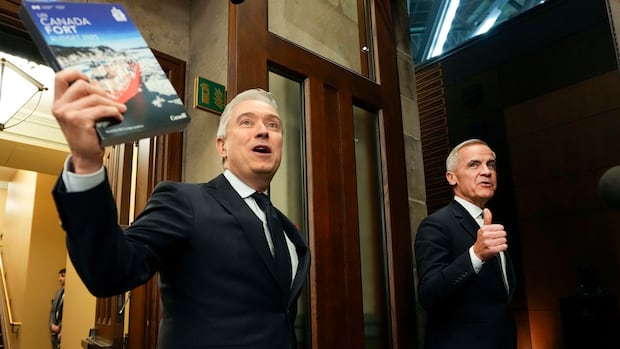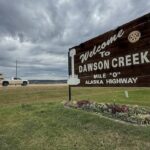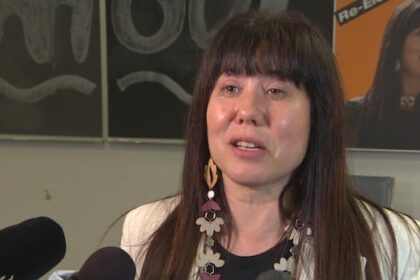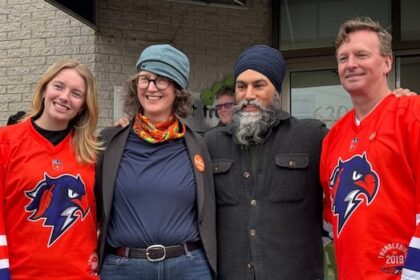British ColumbiaPrime Minister Mark Carney’s first budget was announced on Tuesday, and it includes major implications for B.C. — including more support for the mining and critical minerals sectors, as well as tax writeoffs for “low-carbon liquefied natural gas facilities.”Mark Carney’s first budget as PM offers tax writeoffs for ‘low-carbon’ LNG facilitiesAkshay Kulkarni · CBC News · Posted: Nov 04, 2025 6:45 PM EST | Last Updated: 2 hours agoListen to this articleEstimated 4 minutesPrime Minister Mark Carney and Finance Minister François-Philippe Champagne make their way into the House of Commons Tuesday to table the federal budget, which has implications for B.C. (Justin Tang/The Canadian Press)Prime Minister Mark Carney’s first budget includes major implications for B.C. — including more support for the mining and critical minerals sectors, as well as tax writeoffs for “low-carbon liquefied natural gas facilities.”The budget, which was announced on Tuesday, projects a deficit of $78 billion for 2025-26 in a bid to spend more money on “nation-building infrastructure, clean energy, innovation, productivity and less on day-to-day operating spending.”Carney had already announced that two of the five so-called “nation-building” resource projects are in B.C. — LNG Canada Phase 2 near Kitimat and the Red Chris mine expansion in northwest B.C.Tuesday’s budget has been praised by a national mining association for its proposed supports, even while it has drawn flak from the B.C. Green Party for what it says is a reliance on LNG and fossil fuels.Beyond the implications for larger projects, the budget also affirms federal support for a proposed Filipino cultural centre in Metro Vancouver and other community projects throughout the province.Here are some of the highlights of the 2025 federal budget in B.C.WATCH | B.C. economist weighs in on budget:Mark Carney’s first budget not the ‘generational’ one he promised, economist saysOn Tuesday, Mark Carney’s Liberals presented their first budget to Canadians, projecting a $78 billion deficit this year as the government looks to spend more on large projects and rein in some government spending amid the U.S. trade war. Jock Finlayson, chief economist for the Independent Contractors and Businesses Association, said the budget wasn’t as big of a reset as Carney promised, and more work could need to be done going forward.Mining and critical mineralsTuesday’s budget announcement includes $2 billion over five years, starting next year, to create a critical minerals sovereign fund and invest in critical mineral projects and companies.Critical minerals like copper and aluminum have been a major priority for both B.C. and Canada recently, as the country looks to secure minerals that are essential for technologies like electric vehicles and clean energy.The Mining Association of Canada applauded the Liberals’ budget in a statement on Tuesday, highlighting that it was expanding a number of tax credits being offered to spur critical mineral production.B.C. Finance Minister Brenda Bailey told reporters on Tuesday that she was glad to see the budget’s continued commitment to critical minerals.”This is an area of deep importance for British Columbia,” she said.”You’ve heard our premiers say that British Columbia will become the economic driver of Canada. Much of that has to do with our critical mineral strategy aligned with the federal government.”B.C. Finance Minister Brenda Bailey praised the federal budget’s continued support for mining and critical minerals. (Ethan Cairns/CBC)Forestry supportsB.C.’s softwood lumber industry has been hard hit by the ongoing trade war with the United States, given exports have been geared towards the U.S. for decades, and mills have been closing down with a 45 per cent tariff rate in place on lumber.Tuesday’s budget includes a re-announcement of a plan to spend up to $700 million in loan guarantees for forestry companies, the lion’s share of which is expected to go to B.C. producers given the size of the provincial softwood lumber industry.WATCH | Original announcement of softwood lumber supports:Carney unveils $1.2B aid package for softwood lumber industry, while visiting B.C.After months of pressure and pleading from B.C., the prime minister is making a significant monetary commitment to help Canada’s beleaguered forestry sector. As Brady Strachan reports, the promises come amid the US-sparked trade war and its impact on one of this province’s major exports. It also includes $500 million, largely in grants and contributions, to spur product development and market diversification for the hard-hit industry and millions for retraining lumber workers.While saying that she hadn’t reviewed the budget in detail, Bailey said her government would continue to push for more federal support for B.C. forestry workers.LNGThe government wants to make changes to the tax system that are supposed to benefit what it calls “low-carbon liquefied natural gas facilities.” The budget states this aims to make Canada more competitive with the U.S.Those changes offer tax writeoffs for LNG facilities for expenses incurred for manufacturing and processing buildings before 2030 and reinstating accelerated capital cost allowances for LNG equipment.LNG has been a focus for B.C. of late, drawing criticism from environmental groups who argue that investments in the sector are not forward-thinking and there should be a focus on clean energy instead.WATCH | 2 of 5 nation-building projects are in B.C., including LNG project:2 B.C. projects part of ‘nation-building’ approvals, including LNG expansionBritish Columbia is home to two of the five so-called ‘nation-building’ projects the prime minister has now officially unveiled, phase two of LNG Canada in Kitimat and the expansion of the Red Chris copper and gold mine in northwestern B.C. Meera Bains reports on the process, and concerns about future projects.B.C. Green Party Leader Emily Lowan said the federal budget was confusing carbon capture subsidies and LNG with climate action, and said a move to largely eliminate an oil and gas emissions cap was “political retreat.””We know that Canadians deserve a plan that lowers costs and emissions together, and instead of funding fossil fuel companies, the government should be investing directly in renewables, in Indigenous-led power and green jobs at scale that make life more affordable,” she said.B.C. Green Party Leader Emily Lowan was critical of changes to the tax system that are aimed to benefit what the government calls ‘low-carbon liquefied natural gas facilities.’ (Chad Hipolito/The Canadian Press)ABOUT THE AUTHORAkshay Kulkarni is an award-winning journalist who has worked at CBC British Columbia since 2021. Based in Vancouver, he is most interested in data-driven stories. You can email him at akshay.kulkarni@cbc.ca.With files from David Thurton, Catharine Tunney and Radio-Canada’s Jennifer Magher
How B.C. is impacted by the 2025 federal budget











